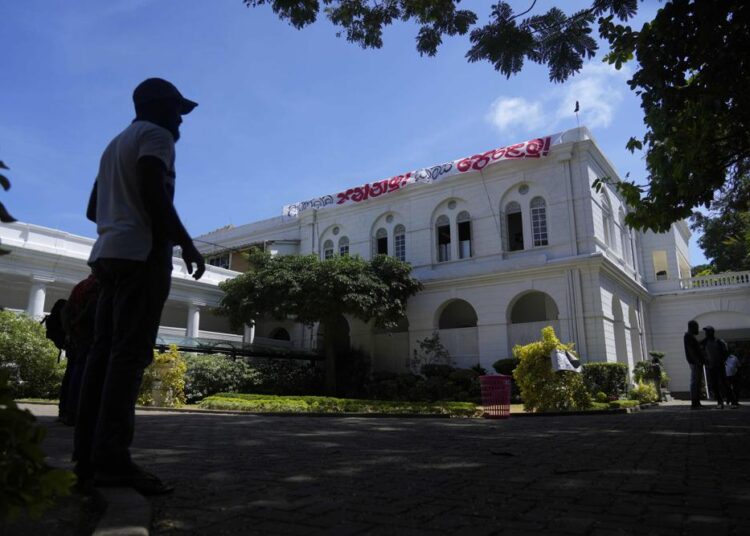COLOMBO, Sri Lanka — Sri Lanka’s embattled President Gotabaya Rajapaksa left the Maldives on Thursday after fleeing his own country amid mass protests demanding he resign over his country’s economic collapse, AP reported.
A Maldives government official said Rajapaksa boarded a flight of Saudia, formerly known as Saudi Arabian Airlines, on Thursday bound for Singapore. The official spoke on condition of anonymity because of the sensitivity of the matter.
Rajapaksa and his wife fled Sri Lanka early Wednesday aboard an air force jet as protesters were taking over government buildings to demand he resign. Rajapaksa promised over the weekend he would do so, but instead he named his prime minister acting president in his absence, further incensing those who blame the government for the crisis.
Meanwhile Thursday, the government announced a curfew in the capital Colombo and its suburbs to run until 5 a.m. Friday and protesters were withdrawing from the presidential palace after occupying it during the weekend. Some were seen unrolling a red carpet in the palace as they left.
Anticipating more protests after a group attempted to storm the Parliament’s entrance a day earlier, troops in green military uniforms and camouflage vests arrived by armored personnel carriers Thursday to reinforce barricades around the building.
Protest leader Devinda Kodagode told The Associated Press they were vacating official buildings after the Parliament speaker said he was seeking legal options to consider since Rajapaksa left without submitting his resignation letter as promised.
The protesters accuse the president and his powerful political family of siphoning money from government coffers for years and Rajapaksa’s administration of hastening the country’s collapse by mismanaging the economy. The family has denied the corruption allegations, but Rajapaksa acknowledged some of his policies contributed to the meltdown.
It was not immediately clear what Rajapaksa’s destination would be. Maldives officials initially indicated he planned to travel onward to Saudi Arabia, but later could only confirm his first stop in Singapore. Since Sri Lankan presidents are protected from arrest while in power it’s likely Rajapaksa planned his departure while he still had constitutional immunity and access to a military jet.
It’s unclear when that might happen since the opposition is deeply fractured. But assuming that Rajapaksa resigns as promised, Sri Lankan lawmakers have agreed to elect a new president on July 20 who will serve the remainder of Rajapaksa’s term, which ends in 2024. That person could potentially appoint a new prime minister, who would then have to be approved by Parliament.
The political impasse threatens to worsen the bankrupt nation’s economic collapse since the absence of an alternative government could delay a hoped-for bailout from the International Monetary Fund. In the meantime, the country is relying on aid from India and China.
The shortages of basic necessities have sown despair among Sri Lanka’s 22 million people. The country’s rapid decline was all the more shocking because, before the recent crisis, the economy had been expanding, with a growing, comfortable middle class.
“Gotabaya resigning is one problem solved — but there are so many more,” said Bhasura Wickremesinghe, a 24-year-old student of maritime electrical engineering, who is not related to the prime minister.
He complained that Sri Lankan politics have been dominated for years by “old politicians” who all need to go. “Politics needs to be treated like a job — you need to have qualifications that get you hired, not because of what your last name is,” he said, referring to the Rajapaksa family.
After the president fled to the Maldives the whereabouts of other Rajapaksa family members who had served in the government were unclear.






Discussion about this post